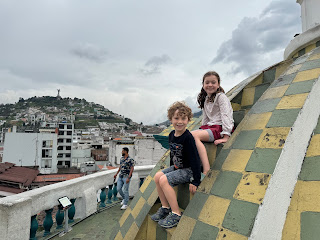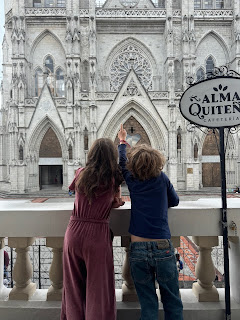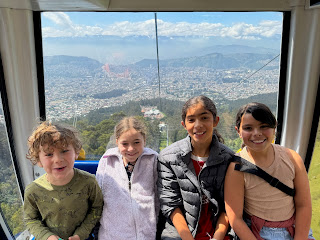After a nice night of sleep for the three non-food poisoned among us, I figured I should at least leave Aimee with a quiet hostel room for the morning. So after a simple first breakfast (our room had its own little kitchenette), I took the kids outside to wander around the hostel grounds.
As we wandered, we met one of our neighbors in the hostel, a Frenchman living in Switzerland (where his wife is from). But for the past several decades, he has been spending his summers in Ecuador, with the last 5 being spent in the room adjacent to ours in Hostal Curiñan. His Andean wood flute playing drifting through the open windows was a delightful soundtrack for the morning, and he himself turned out to be just as delightful. He was in his 70s, and had a warmth that can only come from someone who gets to spend his summers is such a charming setting. As we were chatting in Spanish (which he spoke perfectly, despite it being no less than his fourth language), Jose, the hostel owner, walked by.
Jose and our neighbor talked about playing music later that morning and invited the kids and I. “It’s great, we’ll play some songs and tell stories,” he said. It sounded like a perfect opportunity to visit with our new neighbors and give Aimee a longer respite. But as soon as I agreed (and milliseconds before I put together what it was that I was committing to), Jose added, “Es un culto (worship)!" Right. Songs and stories on a Sunday morning. Those dots should have connected themselves, but I was too smitten with our surroundings to realize that I had accidentally signed us up for a church service.
But as far as church services go, one that pulls together a dozen people from all around the world and is heavy on songs in the Kichwa language in a makeshift chapel overlooking a charming Andean town is about as good as I could have hoped for. Our neighbor played the part of pastor, singing songs and playing along on his guitar and wood flute. Matilde gave the sermon, and the other 10 or so people in the room participated in various calls and responses throughout the songs and spoken portions.
For the first 45 minutes, the kids did great. Quinn played along to the songs on our charango that I had brought down when I still thought it was just a little singalong (nobody seemed to mind that his tuning was rather distinct from the rest of the group's). Mimi sat with Matilde and played with her tiny dog, Mole (who Quinn had renamed "Guacamole" the day before to Matilde's delight). But at nearly the exact same time, both of our kids reached their limit and said to me (at distinctly non-church volumes), “Dad, I’m bored.” Appreciative that very few people in that room spoke English, I sent the kids out quietly and remained for the last 10-15 minutes of the service. Although slightly more discreet than my children, I was no less excited that it was wrapping up. It was a charming little cultural experience, but that only goes so far. The history of Christianity among South American indigenous cultures is extremely complicated, to put it mildly. I’m in no place to judge its current value, but I didn’t need to spend my Sunday morning in the middle of it.
But there was another little bonus to accidentally joining a culto. One of the other attendees was actually a musical instrument maker. Jose introduced me to him after he saw my charango and said that the other person (also named Jose) made them in his workshop a few blocks from the hostel. Yes, I already had one. Yes, it was perfectly adequate for my needs. Yes, I still barely knew anything about the instrument. But still, I couldn’t pass up the opportunity to go check out an actual Andean instrument taller (workshop). So we exchanged phone numbers and made plans to meet in a couple of hours.
[Instrument Jose is the person on the right in the photo above. Hostel owners Matilde and Jose are the other two people in the photo who aren't my daughter. I was too shy to take a photo during the actual service, so I snapped the one above afterwards when instrument Jose was showing me how to play my own charango.]
By that point, Aimee was feeling a little better, so she came down to join us and got a nice laugh out of me accidentally sitting through a church service. But she enjoyed meeting the other hostel residents as much as I did. One of them was from North Carolina, and came to visit the hostel as a visitor after retiring as a psychiatric nurse two years earlier. She quickly decided to make it permanent and has been there ever since.
Ecuador is a retired ex-pat haven. It’s affordable (especially outside of Quito), it’s relatively stable for the region, and there are plenty flights to and from the United States. There were several little communities in the region around Cotacachi and Otavalo clearly catering to ex-pats, and we could absolutely understand the appeal.
Aimee felt like stretching her legs a bit after spending the morning in bed, so we stopped by instrument Jose’s taller in what was ostensibly an attempt to get a small repair on the charango I had already purchased. But I couldn’t not look around at the instruments strewed among his workshop at various points in the construction process. They were beautiful.
It was approaching 1 pm at that point, and none of us had eaten since breakfast. So I didn’t have much time to dawdle at the taller. I silently decided to return later and purchase a second--completely unnecessary--charango. But there was no time for that today. We all walked into town and found a delightful lunch spot literally seconds before everyone melted into hypoglycemic messes.
Since we had a late lunch, I figured we could just snack our way through dinner back at the hostel, so we stopped at the panadería for a few loaves of bread to go with the delicious avocados we had bought for about a quarter each the day before.
Aimee was still touch and go with her illness, and had about two hours of human interaction capacity before she needed to curl back up into our (bathroom adjacent) bed. To give her a quiet afternoon, I pointed out a clover patch by our room and told the kids that finding one with four leaves would be pretty lucky. I watched them frolic around the idyllic hostel grounds, completely unaware of how lucky they already were by simply being there. But what I had hoped would buy us at least an hour of quiet time abruptly ended about 5 minutes later when the kids ran up to our room exclaiming that they had found one!
Man, those kids really are lucky.





.jpeg)





















































